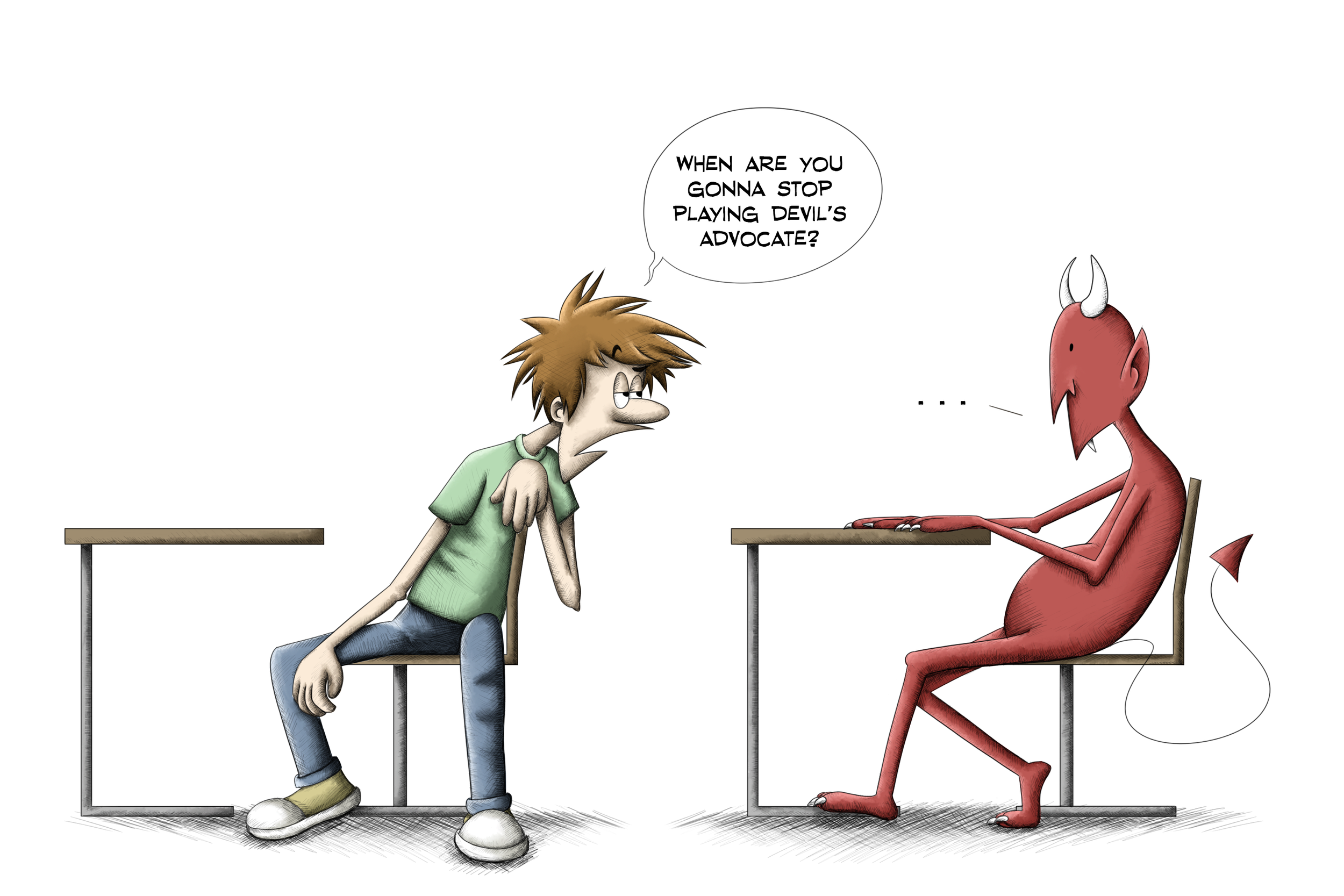Opinion | Devil’s advocate: educational or detrimental?
At what point is playing the devil’s advocate in the classroom opening the forum for insensitive and outdated arguments to flourish? Illustration by MORGAN SEIGLER, Illustrator
On an unassuming fall day just a few weeks into my college career, a student in my First-Year Foundations course asked Chapman President Daniele Struppa, who had so graciously visited the class that day, something along the lines of:
“Theoretically, if I paint a swastika in the library, is that protected by my freedom of speech?”
Megan J. Miller, Opinions Editor
A beat of silence followed. I glanced around the room, gauging the reactions of other students. Just as I was wondering whether someone had seriously asked that, Struppa responded.
It went a little like:
“Technically, yes, but please don’t.”
That was it. Next question. A slew of underlying implications hung in the air of that second-floor Beckman Hall classroom, but we left them there and went on to navigate the four years of college that would follow.
Playing “devil’s advocate” has long since been used as a tactic in the classroom to facilitate diverse conversations, especially when most students in the discussion all share the same point of view. Facing the opposing argument exposes people to new ideas.
It also helps people refine their own arguments, as opposing viewpoints can identify inconsistencies and breaks in logic that otherwise would go unnoticed in a vacuum chamber.
Harkening back to that First-Year Foundations class, I’m happy to report that (to my knowledge), no one followed through on that theoretical. In fact, it sparked an enlightening discussion on the nuances of our freedom of speech.
The university has already stated its position on the matter, asserting that the Chapman community is granted the “broadest possible latitude to speak, write, listen, challenge and learn.”
We challenged, listened and learned – and yet, I still think there’s more to the conversation than what we covered that day.
The last four years have seen The Birth of a Nation controversy, in which Chapman students had to fight tooth and nail to remove an inflammatory film poster displayed at Dodge. A student petition later surfaced to remove controversial busts of historical figures from campus for similar reasons. White supremacist propoganda has been repeatedly slathered across campus.
Of course, we can’t forget the crown jewel of controversy who has frequently made national headlines, John Eastman.
While watching these events unfold, those words from that freshman class came flooding back to me: “theoretically” and “technically, yes, but please don’t.”
How many of the harmful Chapman controversies in recent years began in a similar way – as abstract musings? What about when these devil’s advocate counter-arguments aren’t just theoretical? At what point is playing devil’s advocate just a cover for keeping outdated racist or bigoted ideas alive?
I believe Maya Rupert, a political strategist and writer whose work often explores the intersection of race, gender and culture, said it best.
“Unfortunately, this has invited a dangerous tendency for white people to engage in these discussions with people of color by summoning the devil himself and treating racism as a political disagreement around which two opposing viewpoints can reasonably form,” Rupert wrote in an article published by Slate in 2017.
For her, a Black woman, Rupert said “Just to play devil’s advocate…” appears to be just the latest in a long line of phrases white people hide behind, which includes the infamous “Not to sound racist, but…”
Instead of owning up to white supremacy in conversations about race, they cower behind phrases that essentially say, “I’m not the problem… but if I was…”
Kind of like when you hear “No offense, but…” and you know whatever follows is likely going to be offensive.
Think about it – if it wasn’t offensive, there would be no need to warn about it.
Similarly, if the devil’s advocate wasn’t harmful, why associate it with the devil at all? Sounds like a great way to place a target on your back. Unless people are passing off the ideas as a product of the devil’s inner circle because they know those ideas are socially unacceptable.
Whatever the case, there is no clear answer here. Bringing in the opposing viewpoint is necessary for education; but it’s also exceptionally easy for people to use the devil’s advocate excuse as a way to stoke the flame in classroom discussions, crack an inappropriate joke without implicating that joke is a product of their own misgivings, or downright out themselves as kinda prejudiced without explicitly confirming that they’re actually prejudiced.
Theoretics have power, regardless of how they actually manifest. What are worldviews, if not just a set of ideas? But ideas can quickly become action.
We’re in a state of perpetual “boy who cried wolf,” constantly looking over our shoulder to determine whether the insensitive comments we hear in our daily lives are just another set of harmless red herrings or seriously indicative of a threat.
There was no way I would have been able to tell that day if someone was bringing up such an obscure example – painting swastikas across the library – for mere discussion, was actually considering doing it or even worse, thinking of harming someone else based on the twisted beliefs such a symbol represents.
I’m not sure where we go from here, but perhaps we start by admitting these phrases – “theoretically,” or “just to play devil’s advocate” – aren’t as innocent as they may seem.


